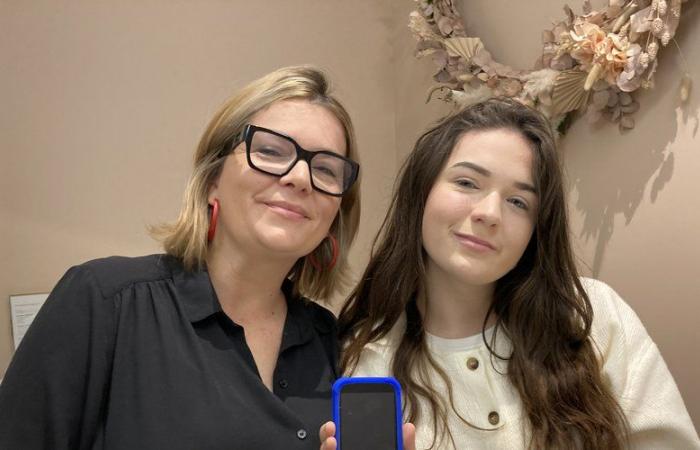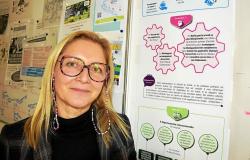
Nelly Lefrançois created Les Diabbudies, an association which supports families of diabetic children. Wednesday November 13, on the occasion of World Diabetes Day, she is organizing a day on the theme “sport and art with diabetes”.
Siloé was indeed a little pale but nothing alarming. And then, suddenly, a stubborn urinary infection, “my daughter lost seven kilos in 48 hours”, remembers his mother Nelly Lefrançois who, at the same time, had to leave for Paris after the sudden death of her father. “Siloé is then entrusted to her grandmother who calls me because she is screaming in pain, you can imagine my panic…”
The child was taken to the Nîmes hospital which immediately transferred her to the Montpellier University Hospital. “She’s in a coma, the doctor tells me, ‘Your daughter is diabetic, she might not make it through the night.’ I’m taking an anvil to the head!” It was October 21, 2018, Siloé was going to be 10 years old…
“The anxiety of hypoglycemia”
And the life of the little girl (and her family) is suddenly turned upside down! “We had to mourn the life before”smile Nelly and Siloé, 16 years old today, mother and daughter united by illness. And move forward despite the unanswered questions: “I work in catering, we have always been careful about what we eat, always cooked healthy products, I had never heard of type 1 diabetes but fortunately I have some knowledge of nutrition and glycemic indices…”
“Acceptance of illness is essential” for Randa Salet, pediatrician at the University Hospital
What type of diabetes affects the child?
90% have type 1 diabetes. It is an autoimmune disease which causes the destruction of the cells of the pancreas that produce insulin but we do not know, to date, what triggers this autoimmunity. Childhood diabetes is not hereditary.
How many children are affected?
In France, the prevalence is one case per 16,000 people and this increases by 4% each year. Today, around 25,000 children have diabetes. It is a very restrictive chronic illness that can occur at any age, even in the first months of life.
How to manage diabetes in children?
Diabetes is treated with insulin injections using devices such as
“pens” or the insulin pump: an injection of insulin before each meal. For three years, we have been installing new “smart” closed-loop pumps. This is the Holy Grail of treatment in 2024. This pump communicates directly with the blood glucose sensor and delivers insulin in a suitable manner without intervention outside of meals. The only constraint: announce your meals and calculate your carbohydrates. At the Nîmes University Hospital, out of 350 diabetic children monitored, 100 have a closed loop pump and they feel less mental burden, they have the feeling that someone is taking care of their diabetes with them. For parents too, it’s less stress and sleepless nights.
How to live with diabetes as a child?
What is essential is acceptance of the illness and positive reception from the family. Sometimes a change in eating habits is essential for the whole family. It’s a restrictive illness but you can integrate it into your daily life and continue exercising.
Ultimately, we can live better than many people if we eat better and get the right insulin. The body has a memory of dietary errors and excesses and complications can appear in the long term. A diabetic child who has unbalanced diabetes risks having after-effects in adulthood. Diabetes will have effects on the eyes, kidneys, heart, blood vessels and brain.
Closed loop significantly improved diabetes balance and reduced burden
mental but it did not solve all the problems.
Where is diabetes research?
Researchers are working on immunity. We are still in clinical trials but treatments will be available within ten years to prevent the onset of type 1 diabetes.
At 10 years old, Siloé does not yet understand the seriousness of her illness, she remembers the six injections per day which hurt so much, “you always had to negotiate with me”. Her mother recounts the anxiety of hypoglycemia, with the risk of coma, “I got up every night to put candy in his mouth…”
“We feel very guilty”
For two weeks, Siloé has benefited from a new closed-loop pump, which regulates blood sugar levels. “For me, it’s magical, enthuses the young girl, who always has with her a small survival kit with insulin and sugar, I am much more independent…” Even though she is calmer, her mother still keeps an eye on her daughter’s blood sugar levels, which are also displayed on her cell phone. “We feel a lot of guilt. At the beginning, at every meal, I cried. I was so afraid of being responsible for his death.”
Wednesday November 13: a “sport and art with diabetes” day
The Diabuddies association and the pediatric department of the CHU are organizing a day on childhood diabetes on Wednesday, November 13, from 9:30 a.m. to 4:30 p.m. at the Diocesan House (6 rue Salomon-Reinach). At 10 a.m., conference by Doctor Salet on “Diabetes and sport”. At 11 a.m., introduction to aikido and fencing for children. At 11:30 a.m., upcycling workshop around diabetes. At midday, free meal break. At 2 p.m., time for discussions between parents, testimonials…, pastry workshop for children and upcycling. At 3:30 p.m., presentation of prizes for the children and the CHU sponsored by the Gard’le smile association. At 4 p.m., snack prepared by the children.
Diabuddies associations: 06 95 53 58 41.
“This disease is like an iceberg”
At the start of her daughter’s illness, Nelly shared her daily life on Instagram, so as not to be alone with her anxieties, to always take the drama down, exchange tips and tricks, “being a caregiver also means being a nurse and a mother at the same time… it’s not always easy.” Very quickly, many mothers contacted her and, in 2023, Nelly Lefrançois created the association Les Diabuddies, for parents of diabetic children. “Once a month, on Saturday, we meet around coffee to share our experiences and comfort each other. We also have a WhatsApp group where we support each other at all hours, even at night, because diabetes is 24 hours a day Many mothers feel alone, cannot accept the illness…”
Despite the daily mental load, six years of sleepless nights for Nelly, inevitable bouts of slack, mother and daughter always remain positive. “I put the constraints into perspective, I tell myself that there is always worse”, Siloé says. “This disease is like an iceberg, adds Nelly and it’s a hell of a life lesson!” Which they both take head-on and with a smile.





